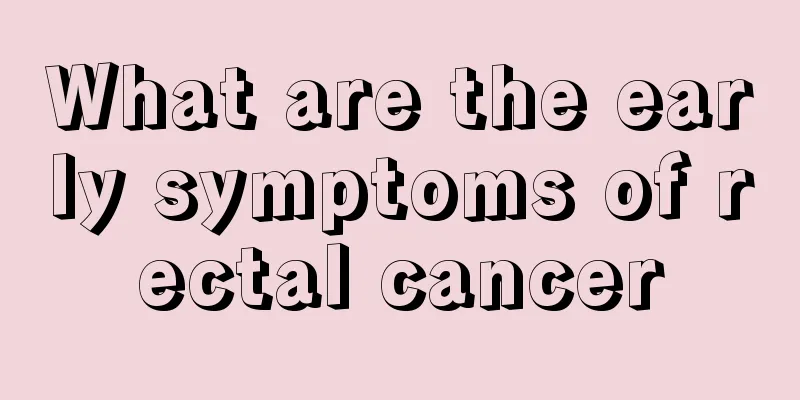What are the early symptoms of rectal cancer

|
Early symptoms of rectal cancer may include changes in bowel habits, blood or mucus in the stool, abdominal pain, etc. If you experience the above symptoms and they persist for a long time, you should seek medical attention as soon as possible. Early diagnosis and treatment can significantly improve the cure rate. 1. Changes in bowel habits Early stage colorectal cancer may cause intestinal dysfunction, which is manifested by increased or decreased bowel movements, long-term constipation or alternating diarrhea. This symptom may be caused by intestinal stenosis caused by tumor space occupation, or by stimulation from tumor secretions. If this change lasts for more than two weeks and cannot be restored by normal diet adjustment, it is recommended to consult a doctor in time and undergo a colonoscopy. 2. Blood in stool or abnormal secretions Fresh blood or mucus mixed with blood during bowel movements is one of the hallmark symptoms of rectal cancer and is particularly easy to be mistaken for hemorrhoids. If the blood in the stool is accompanied by dark color and increased volume, and the stool is thin or unformed, it should be taken seriously. The presence of a lot of mucus in the stool is also a signal that needs attention. 3. Abdominal pain or discomfort When the tumor in the intestinal cavity develops to a certain extent, it may cause dull abdominal pain, a feeling of heaviness or difficulty in defecation. This kind of abdominal pain is usually not severe, but it may get worse after a meal or during a bowel movement. If it is accompanied by systemic symptoms such as weight loss and fatigue, you should be alert to the possibility of rectal cancer. 4. Persistent indigestion or feeling of incomplete bowel movement Early stage colorectal cancer may cause digestive system disorders. Some people often feel abdominal bloating or a feeling of incomplete bowel movement after defecation. This situation is different from general gastrointestinal problems and is not significantly relieved by dietary adjustments or conventional drug treatments. If you experience the above symptoms, you should go to the hospital immediately for a diagnosis through colonoscopy, rectal examination or pathological examination. Early detection of rectal cancer and the use of surgical resection, radiotherapy or targeted drug therapy have a very high cure rate. Paying attention to the changes in daily body signals and developing a habit of regular physical examinations are the keys to preventing and coping with rectal cancer. |
<<: Is the small osteoma of the left ethmoid sinus serious?
>>: What causes uterine cancer at the age of 30
Recommend
What are the common causes of hamartoma
Hamartoma is a tumor disease with a very complex ...
How many years can you live after brain cancer surgery
Since the surgery does not completely eliminate t...
What are the reasons for the high incidence of tongue cancer
Oral ulcers will heal within half a month. If the...
Pathological morphology of early esophageal cancer
Early esophageal cancer includes carcinoma in sit...
Skin pimples after sun exposure
When going out in the summer, you must do a good ...
How to treat advanced breast cancer
Clinically, the treatments for advanced breast ca...
The world's 9 major self-harming health-preserving methods, the more "harmful" you are, the more beautiful you are!
In life, we are constrained by too many rules and...
A few years of chemotherapy for prostate cancer 10 courses of treatment
How many years does it take to complete 10 course...
What causes liver tumors?
The harm of liver tumors is very serious, so earl...
How do families carry out parent-child games? What are the characteristics of parent-child games?
Children in modern families generally have parent...
What are the dangers of hyaluronic acid injection in the nose
Today's society is a society that attaches gr...
What are the side effects of chemotherapy for localized endometrial cancer? There are these 6 side effects
One of the side effects of chemotherapy for local...
What kind of wine is rice wine? Nutritional value of rice wine
There are differences in rice wine between the no...
Where is the spinal cord?
In daily life, we must pay attention to the prote...
Should teratoma undergo surgery?
We know that surgery can be used to treat teratom...









